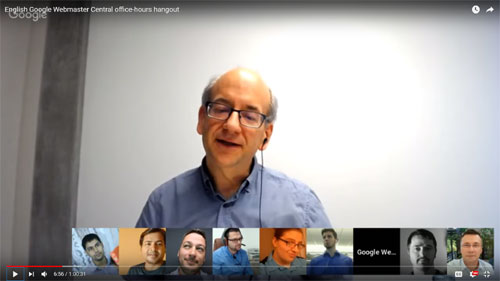In a recent Webmaster Central Hangout, Google’s John Mueller answered a question about optimizing content for voice search.
Mueller offered suggestions of which kinds of content works and detailed the kind of content that was not a good fit.
He also cautioned about over-optimizing and offered an example of what might be interpreted as spam.
 Google’s John Mueller discusses optimizing content for voice search and Google Assistant.
Google’s John Mueller discusses optimizing content for voice search and Google Assistant.Google Assistant for speakers and cars will display information on screens.
Google recently sent notices to publishers advising them how to make their content more discoverable by Google Assistant.
While currently limited to certain kinds of content like news, recipes and podcasts, it’s not unreasonable to expect Google Assistant to expand to other kinds of content.
Understanding how to optimize your content for Google Assistant thus becomes an important consideration.
Use Structured Data
At Pubcon Las Vegas this past November, Gary Illyes encouraged publishers to integrate structured data into their websites because Google would be coming out with new features in 2018 that would take advantage of it.
Making content voice assistant friendly may be one of them.
Mueller suggested that anything you can do to communicate what the page is about will be helpful, specifically mentioning Structured Data.
“I think that’s really complicated because from Google’s side, what we try to do is to understand your page.. and to figure out with which type of voice queries match those pages. So that’s something you can help us with using structured data on the pages so if you tell us a bit more about what this page is about.”

Consider Voice Snippets
Mueller suggested thinking in terms of how your content may fit into the context of a voice snippet.
“Something you can perhaps also tell us if you have… kind of like information that could be combined into a voice snippet- that might be useful for some kinds of content…”
Consider How Your Content Sounds Out Loud
Another helpful tip was to consider how your content is organized.
For example, content that is displayed in a large table might not be suitable for Voice Assistant.
If the content cannot be read aloud and still make sense, then there’s a good chance it may not be suitable for showing up in voice searches.
“…that’s not possible if you have a question and the answer is a big thing or a table or a list of links. That’s not something that really works with voice…”
Make Your Content Easy for Users to Read
The following is kind of a basic bit of advice but it becomes even more important now that the direction of search is shifting to voice searches.
Mueller suggests that for some kinds of voice searches, it may be useful to give a direct answer to a question and to make it very obvious that the paragraph is an answer to that question.
“I know for some other kinds of voice assistance they try to match the question more directly… so they’re looking for maybe web pages that say… …what is the tallest mountain as a title and then they read the first paragraph.”
Don’t Over-Optimize for Voice Search
Perhaps anticipating that web publisher might rush out to create single paragraph webpages to target voice search, he then cautions against this approach:
“I think for Google that’s probably overdoing it and quickly ends up in a situation where you basically create a doorway site with like all these question variations and like a short piece of answer and the pages themselves have really low value because… they don’t have a lot of information, they’re just targeted for this one specific query…
…I think that’s very shortsighted if you were to go in that direction.”
That’s excellent advice.
Takeaways
Overall, the big takeaways here are:
- Use Schema Structured Data
- Create content that sounds natural when read aloud, is clear and intelligently structured.
- If targeting voice search, then you may also want to rethink how your content is delivered and avoid pages of links or large tables full of data.
- Perhaps a workaround for tables may be to discuss the contents of the table in a manner that makes sense for the user and have the table be a visual device for communicating the same information.
Write Natural Content
Mueller then concludes with the encouragement to write naturally.
“Really kind of focus more on trying to make it so that Google and other search engines can understand the context of information a lot better and to make sure that your content is written in a way that can be read aloud. Which I think is a general guidance anyway.
…if you write naturally and you write in a clear kind of language that’s consistent across the type of queries you want to target then that’s the type of information that we could pick up for voice as well.”
More resources
- Are You Optimized for Voice Search? Here’s How to Do It
- 5 Ways Voice Search Changed in 2017 & How to Prepare for 2018
- How Voice Search Will Impact Your SEO, PPC & Social Strategies
- SEJ Live: Purna Virji on Voice Search
Images by Shutterstock, modified by Author


